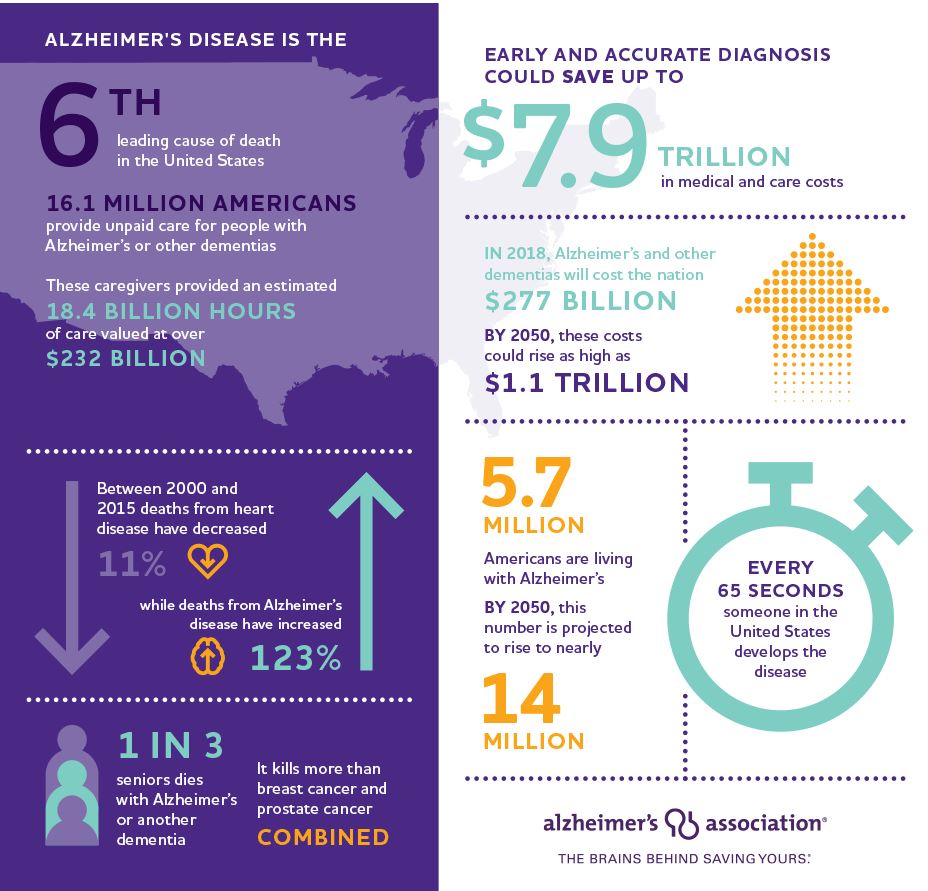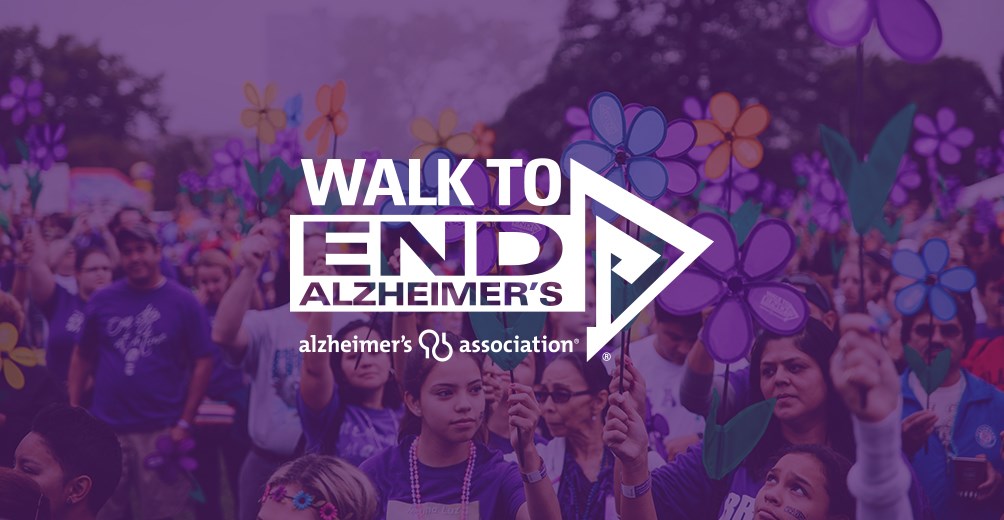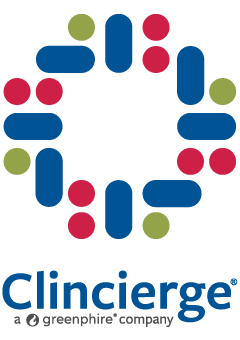Celebrated since 1983, Alzheimer’s & Brain Awareness Month is observed each June to raise awareness of the most common form of dementia. Dementia is an umbrella term for a group of medical conditions characterized by brain impairments that affect one’s daily life.
These conditions include Alzheimer’s disease, Parkinson’s disease, Huntington’s disease, frontotemporal, vascular, normal pressure hydrocephalus, Lewy body, Creutzfeldt-Jakob disease, Wernicke-Korsakoff syndrome, and mixed dementia (caused by more than one type of dementia).
Alzheimer’s disease accounts for approximately 70% of all dementia cases and is prevalent in our society today. While treatment options can help alleviate the symptoms related to Alzheimer’s disease, there is currently no cure for this progressive disorder.
Facts about Alzheimer's disease
Currently, nearly 50M people worldwide are living with Alzheimer’s disease. This number is expected to reach 132M people by the year 2050. Below are some additional facts about the progression of the disease and risk factors.
- Alzheimer’s disease is a chronic disease and is progressive in nature, causing worsening cognitive and mobility issues.
- While symptoms are initially mild, those with late-stage Alzheimer’s often lose their ability to interact with others and the world around them.
- They often cannot form words, string together thoughts, or remember memories.
- There are 7 Stages of Alzheimer’s disease, beginning with Normal Outward Behavior and ending with Very Severe Decline.
- Most people live an average of 7 years with Alzheimer’s disease, but some can live 20 years or more.
- Sadly, Alzheimer’s disease is always fatal.
- The most significant risk factor for Alzheimer’s is age, and most individuals living with the disorder are over 65.
- Family history, genetics, head injuries, and depression are also risk factors for Alzheimer’s disease.
History of dementia and Alzheimer's disease
Medical personnel and scholars have been looking to unlock the mysteries of dementia for many centuries. This section illustrates that studying the brain and its functions started long ago.
- 2000 BC: Ancient Egyptians first documented memory decline associated with aging
- Second Century AD: Turkish physician Aretaeus wrote of dementia as it related to delirium. While delirium is a reversible disorder, dementia is chronic and cannot be reversed.
- Middle-Ages: Theocracy reigned during this era, and those with dementia were thought to be possessed by demons. The disease was regarded as a punishment from God for sins, and these beliefs carried over into the 14th and 15th centuries.
- 600 AD: The word “dementia” first appeared in a book by Saint Isadore, archbishop of Seville. The word “dementia” is derived from the Latin words “de” (meaning deprivation or loss), “ment” (meaning mind), and “ia” (meaning indicating a state).
- 1906: German physician Alois Alzheimer documented the case of a 50-year-old woman with severe memory loss.
- 1910: Alzheimer’s disease is named after Dr. Alzheimer.
- 1980: The Alzheimer’s Association is founded and leads the fight against Alzheimer’s disease.
Available treatment methods for Alzheimer's disease
Over the last 30 years, several drugs have been approved by the United States Food and Drug Administration (FDA) as treatments for patients in the United States with Alzheimer’s Disease:
- 1993: The FDA approved the drug Cognex as the first treatment targeted against Alzheimer’s disease. This treatment was later withdrawn from the US market in May of 2012.
- 2003: Namenda was approved as the only drug for moderate to severe stages of the disease.
- 2004: The FDA approved Aricept for confusion related to all stages of Alzheimer’s disease.
- 2004: In the same year, Razadyne was approved for use in mild to moderate confusion related to Alzheimer’s diseases.
- 2007: The Exelon Patch was approved as the first 24-hour non-oral Alzheimer’s disease treatment.
- 2021: The FDA approved Aduhelm for the treatment of Alzheimer’s disease. This new treatment targets the collection of beta-amyloid proteins in the brain.
It is important to note none of these treatment options slow down the progression of Alzheimer’s disease or act as a cure. They can, however, ease some of the symptoms related to the disorder, prolonging the patient’s independence and offering an improved quality of life.
Ways to celebrate Alzheimer's & Brain Awareness Month
Throughout the month of June, Alzheimer’s disease patients, families, caregivers, and advocates are urged “Go Purple.”
Individuals are encouraged to wear purple as it is the official color of the Alzheimer’s movement. The association offers a purple profile picture frame to use on social media and the hashtags #ENDALZ and #TheLongestDay.
Known as the summer solstice, June 21st is the longest day of the year with the most daylight. The Alzheimer’s Association uses this day for their awareness event and fundraising campaign known as The Longest Day. Aimed at highlighting the long and often arduous journey Alzheimer’s patients and their families face, people worldwide join together in the fight against Alzheimer’s disease. Participants choose from a list of activities, including exercise, games, sports, and arts. They can participate from their home, online, or at an in-person event.

Through these events in June and others throughout the year, the Alzheimer’s Association and other similar organizations aim to raise awareness and funding to continue Alzheimer’s disease research.
Special considerations for clinical trial patients with Alzheimer's disease and dementia
There are currently several FDA-approved treatment methods for Alzheimer’s disease, but still no cure. This progressive and debilitating disease takes the lives of more than 120,000 people in the US each year, and this number continues to grow.
Clinical trials have proven to be an excellent way to get new treatment methods to market while offering the hope of a cure for this disease someday. However, for patients with disorders like Alzheimer’s disease, the burdens of clinical trial participation can seem insurmountable. Many patients face medical issues like cognitive, emotional, and mobility decline.
When pharmaceutical sponsors and clinical research organizations (CROs) consider the patient journey throughout the trial, they are better positioned to increase their trial enrollment and retain patients through trial completion.
Upon trial enrollment, patients and their caregivers are paired with a local coordinator who speaks their language in their time zone. The coordinator learns the travel preferences of the patient and their caregiver and begins to anticipate their needs as the decline inherent to the disease starts. The coordinator checks with the patient and caregiver often to provide appointment reminders. They assist with other services such as ground transportation, wheelchair-accessible flights and vehicles, and meal and incidental reimbursements.
By partnering with a patient support services provider who understands the nuances of a disorder such as Alzheimer’s disease, pharmaceutical sponsors and CROs ensure all emotional, financial, and logistical barriers to clinical trial participation are removed. The patient and their caregiver can focus on fighting the disease and helping find a cure for debilitating disorders like Alzheimer’s disease.
Learn More
Read our Alzheimer’s blog to understand why supporting the fight against Alzheimer’s disease is so important to Clincierge employees.
Additional Alzheimer’s Disease Resources:



